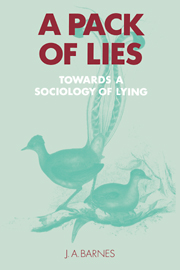Book contents
- Frontmatter
- Contents
- Preface
- Acknowledgments
- 1 What is a lie?
- 2 Where lies are expected
- 3 Ambiguous domains
- 4 Science
- 5 Cultural diversity
- 6 Relations
- 7 Self-deception and connivance in deceit
- 8 Telling and detecting lies
- 9 Benign untruths: the discourse of fiction
- 10 Evaluations
- 11 Do we have to have lies?
- References
- Index
8 - Telling and detecting lies
Published online by Cambridge University Press: 29 August 2009
- Frontmatter
- Contents
- Preface
- Acknowledgments
- 1 What is a lie?
- 2 Where lies are expected
- 3 Ambiguous domains
- 4 Science
- 5 Cultural diversity
- 6 Relations
- 7 Self-deception and connivance in deceit
- 8 Telling and detecting lies
- 9 Benign untruths: the discourse of fiction
- 10 Evaluations
- 11 Do we have to have lies?
- References
- Index
Summary
SOCIALIZATION AND PERSONALITY
The ability to tell lies and the complementary ability to detect them, which so far in our discussion we have taken for granted, do not appear fully fashioned in every newborn child. They develop gradually as part of the process of growing up, along with the socially based knowledge of when to make use of these abilities. In this chapter we look at how children grow into adults capable of telling lies, and at how the dissemination of successful lies is facilitated by certain characteristics of language.
Children do not always spontaneously speak the truth. In many cultures, though perhaps not in all, a considerable amount of effort is put into training children to be honest, or at least in teaching them when to be honest. In some communities, moral and physical pressure is augmented by threats of supernatural sanctions against lying, such as being struck dead by lightning, the growth of a tree on one's tongue (Vincenzi 1977:40) or the elongation of one's nose, like Pinocchio. Rather less cultural emphasis is placed on the desirability of parents being honest with their children, and many commentators regard some of the lies told by adults to children, such as that storks bring babies, and that Father Christmas brings presents, as excusable and even desirable.
- Type
- Chapter
- Information
- A Pack of LiesTowards a Sociology of Lying, pp. 103 - 121Publisher: Cambridge University PressPrint publication year: 1994
- 1
- Cited by



